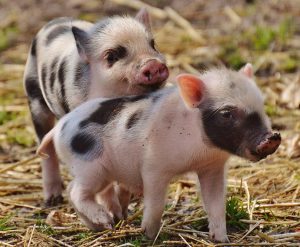 When you’re considering a house pet, you naturally think dog or cat, or perhaps a parrot, rabbit or goldfish. Rarely does house pet and pig appear in the same thought. For most people. But there are others who have fallen hard for the intelligence, charm and loyalty of pot-bellied or miniature pigs. Whether you’re a fan of these porcine pets or not, there’s one thing most everyone can agree on: When they are babies, THEY ARE CUTE! And more than one unsuspecting admirer has fallen under the spell of these adorable cuties only to realize a month down the road, taking care of a pet pig is more than they bargained for. Here’s what you should know before you invite a sweet, little piglet into your kitchen.
When you’re considering a house pet, you naturally think dog or cat, or perhaps a parrot, rabbit or goldfish. Rarely does house pet and pig appear in the same thought. For most people. But there are others who have fallen hard for the intelligence, charm and loyalty of pot-bellied or miniature pigs. Whether you’re a fan of these porcine pets or not, there’s one thing most everyone can agree on: When they are babies, THEY ARE CUTE! And more than one unsuspecting admirer has fallen under the spell of these adorable cuties only to realize a month down the road, taking care of a pet pig is more than they bargained for. Here’s what you should know before you invite a sweet, little piglet into your kitchen.
Myths About Pot-Bellied Pigs
If you’re considering becoming a pig parent, you might be concerned about the following common beliefs.
- Pigs are dirty. Wrong. Pot-bellied pigs are actually quite clean and prefer not to soil their living space.
- Pigs smell. Nope. They have no odor.
- Sweat like a pig? No, you don’t. Pigs don’t sweat—except through their noses.
Characteristics and Considerations
Pot-bellied pigs are friendly and sociable. They like human companionship, and if left alone for long periods, can get depressed, irritable or destructive. They are very intelligent and can be easily housebroken—either to a litter box or outside. Pigs can be taught to obey commands, walk on a leash, fetch a ball—most anything you can teach a dog, you can teach your pig. Part of the reason they are so easily trainable is they are very food motivated—anything for a treat. But that can lead to another common problem in pet pigs—obesity. You need to feed the right foods in the right quantities to provide for their nutritional needs without adding extra pounds.
Because a pot-bellied pig is considered a house pet, he or she needs to spend a lot of time inside. You should provide them with their own space, with a bed or sleeping box, where they can go for naps or to just get away for a while. Just like you would child-proof or puppy-proof your home, you’ll also need to pig-proof it. Pigs are curious and will go where they shouldn’t, open doors they shouldn’t, and get into things they shouldn’t. You need to allow for time outside, as well. A yard with a sturdy fence will let them play, explore, and soak up the vitamin D. Be aware that they like to root around in soil, searching for food, so block off vegetable and flower beds or they will soon be history.
Pot-bellied pigs have a life expectancy of 12 to 15 years or more, so you must be willing to make a long-term commitment. They form strong bonds with their humans and often don’t adjust well when you try to rehome them. That’s why it’s so important that you do your homework and make sure you can provide a long-term, loving home. Also, make sure you live in an area that is zoned for pot-bellied pigs.
Veterinary Care
Another way in which pot-bellied pigs are like other household pets is veterinary care. They may not need the same care as your other pets, but they need regular health exams, vaccinations for pig-specific diseases, appropriate nutrition, skin care and, instead of nail trims, they need hoof trims. They also need to be spayed or neutered; otherwise they are likely to develop aggressive behaviors.
Pot-bellied pigs can make affectionate, fun, and rewarding companions—for the right person or family. Make sure you are up to the challenges before you make the plunge. If you decide you want to become a pig parent, give Powell Veterinary Services a call at 970-352-9164, and we’ll set up a health care plan that will ensure a long, contented life.



WORKING HOURS:
Monday-Friday 8:00am - 5:00pm
Saturday 8:00am - 12:00 noon